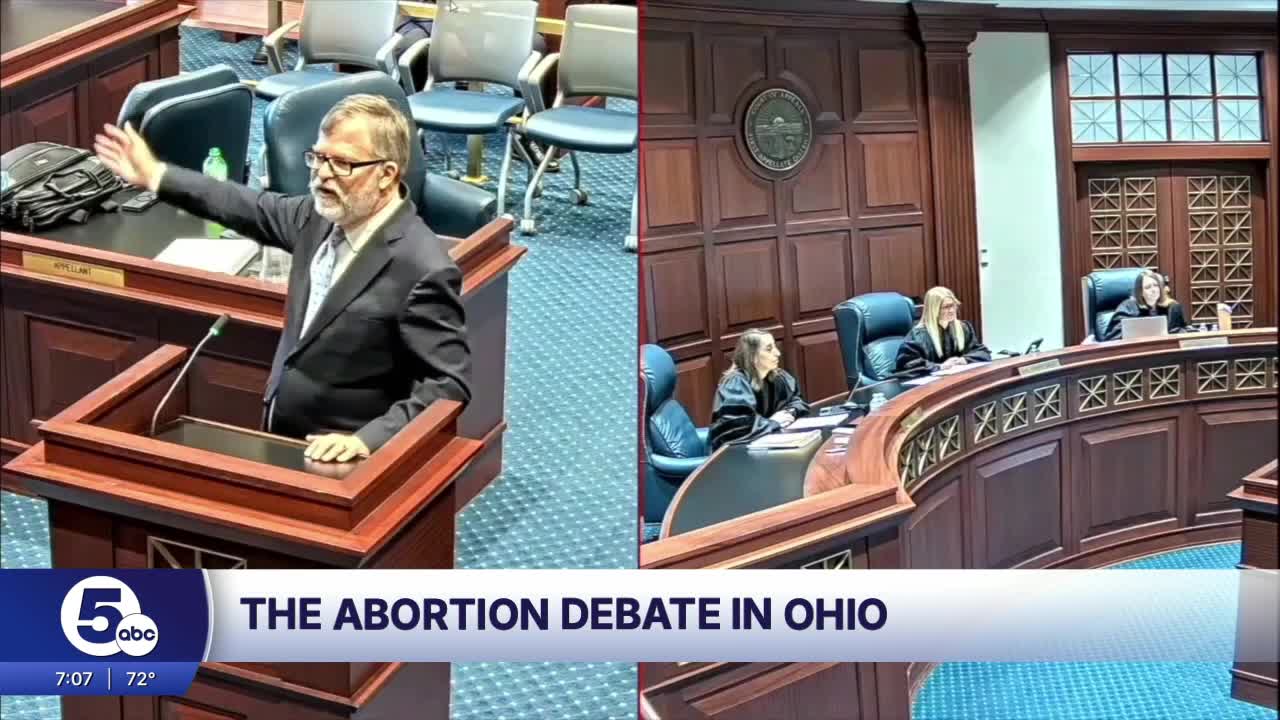COLUMBUS, Ohio — The state of Ohio continues to fight for the struck-down six-week abortion ban bill, despite acknowledging that it is unconstitutional. In an appellate court hearing on Tuesday, the attorney general's team argued that some provisions inside the legislation are worth another look.
A panel of three Cincinnati-based judges will decide the fate of Ohio’s six-week abortion ban, one that has a dozen other provisions inside the legislation.
"Our argument is that those provisions must also fall," Attorney for the ACLU of Ohio Cassie Mitchell said Tuesday morning.
The six-week ban, one without exceptions for rape or incest, was included in Senate Bill 23, which was signed into law in 2019. The legislation also made it a felony to perform an abortion without checking cardiac activity, created an avenue to sue for wrongful death and allowed the State Medical Board to revoke doctors' licenses if they conduct an abortion without checking for cardiac activity or if it is after six weeks.
Mitchell argued that this case has been settled.
Issue 1 passed in Nov. 2023, 57-43%, enshrining reproductive rights into the state constitution. It says Ohioans have the right to make their own decisions about abortion, contraception, fertility treatment, miscarriage care and continuing pregnancy. The state is prohibited from interfering with or penalizing someone for exercising this right.
The six-week ban is unconstitutional now, Mitchell said. Hamilton County Judge Christian Jenkins agreed, striking down the vast majority of S.B. 23.
RELATED: Ohio judge strikes down 6-week abortion ban
"They seem to be saying, 'Okay, this heartbeat provision is unconstitutional,' which the state agrees with," Judge Candace Crouse said.
"Everyone agrees," Ohio Deputy Solicitor General Stephen Carney responded.
Carney still appealed the ruling, though, because he believes that the other provisions deserve to remain in law.
The appeal hinges on severability, which is the ability for provisions to stand on their own even if other aspects of the legislation are found unconstitutional.
Carney said that Jenkins shouldn't have been able to strike down other provisions in S.B. 23, since the ACLU didn't explicitly ask for him to, and there wasn't a severability analysis.
In S.B. 23, there is a severability clause — stating that if anything is found to be invalid, that ruling wouldn't impact the rest of the legislation.
"The legislature's intent here says, 'We want to keep whatever we can keep,'" Carney said.
Legal experts tell us that judges have jurisdiction and can determine, on their own, what has severability or not.
The state argued that certain provisions can stand on their own, but didn't say which ones during the oral arguments on Tuesday or go in-depth in their filings. We followed up with the attorney general’s office, asking for three provisions as an example, but they didn't address that when responding that the court hearing was "technical and procedurally necessary to ensure fair outcomes.”
"Is it the Attorney General's position that the Attorney General of Ohio was surprised by the concept of severability in the face of a constitutional challenge?" Judge Jennifer Kinsley asked.
"Yes, your honor," Carney said. "I can't waive privilege, but I was befuddled, confused, because I've been doing this 28 years, and I've never seen someone say 'This provision is bad, therefore strike the whole bill.'"
The ACLU responded that there didn't have to be a request from them for the judge to evaluate. Even so, the ACLU helped carve out a few provisions that the government wanted to keep, including ones about adoption and foster care policy. Jenkins did make those exceptions when striking down S.B. 23.
Three outcomes can come from this court: the panel can agree with the lower court and uphold Jenkins' ruling, they could send the case back to the lower court to review the severability aspect, or they could completely reverse the court's decision and allow for all the other provisions, but not for the six-week ban.
And Jenkins will likely make the same decision he did previously, Mitchell said.
"This court can resolve this now," she said. "It can give plaintiffs and their patients the certainty they need as to what the requirements of Ohio law are, and we can just all move on."
The judges on the case are all Democrats, as the entire bench in the First District is, so it is unlikely they will completely reverse the decision without remanding it to the lower court. Carney pushed for the case to go back to the trial court, saying this case is about more than just abortion.
"All we're asking is that you follow the rule of law, the normal rules of the road that every plaintiff has to meet, versus creating this radical roadmap for everyone to strike down a lot of state laws," he said.
Mitchell argued that the government has already made all of their severability claims in the lower and appellate courts. All of the remaining provisions are reliant on the six-week ban being in place, the ACLU said, so they continued to argue that this was a non-issue.
"They go together as a package deal to further the six-week ban," Mitchell said.
When pressed by the judges, the government did say that if the case was sent back to the trial court, they would not attempt to enforce the six-week ban.
RELATED: Republican lawmakers in Ohio to propose total abortion and IVF ban





